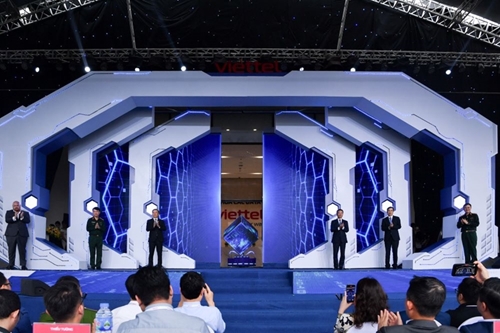The debut of this center was a testament to Viettel’s commitment to pioneering and being the key in building Vietnam’s digital infrastructure that meets international standards.
From national telecommunications infrastructure
In 2004, Vietnam had nearly 2,000 base transceiver stations (BTS). Mobile phone service was expensive with VND 1.5 million for connection fee, VND 300,000 per month for maintenance fee, and the rate of VND 3,000-8,000 per minute of call. For comparison, the price of gold at that time was only nearly VND 5 million a tael while the price currently reaches nearly VND 80 million a tael.
    |
 |
|
At the ceremony to debut Viettel Data Center - the largest of its kind in Vietnam, April 2024 |
On October 15, 2024, Viettel Mobile was put into operation. At that time, Viettel’s dream was simple that each Vietnamese would own a cellphone. Many thought it was impossible because it was hard to imagine that a farmer or a student would have a cellphone for a call when needed since the cost for a mobile phone and its services could feed a family member.
But Viettel considered it a goal that must be achieved.
Three years later, the number of Viettel’s BTSs was higher than the total number of BTSs of other developers in Vietnam.
The biggest contribution of this military group was creating a motivation for other enterprises of the same industry to develop. The race for market share helped reduce fees in the direction that benefited users. The rate of cellphone users rose to 95% in 2007 from 5% in 2004, and accounts for 130% at present. Vietnam became one of the countries with the highest growth in the number of mobile phone users in the world.
By the end of 2009, Vietnam had had more than 40,000 BTSs and half of them belonged to Viettel.
In 2009, 3G technology was in service in Vietnam. Viettel installed 8,000 3G BTSs, about 1.5 times higher than its commitment of 5,000 BTSs. The number of BTSs was on the rise. In 2011, Viettel covered all district centers and neighboring communes of 63 provinces and cities nationwide, benefiting 90% of the nation’s population.
The 3G technology offered high-speed connection that facilitated internet use in Vietnam, providing wider coverage area, and cheaper fee, just VND 10,000 per month.
DCOM-3G devices brought connection chances for 19 out of 23 million households, who had not had wireless connection at that time. Such devices were also presented to schools in remote and mountainous areas to help teachers and students acquire online knowledge.
Together with infrastructure, Viettel also concentrated on developing information technology (IT) applications with the motto of “Bringing IT-telecommunications to all corners of life.” Gradually, mobile phones have become a necessity of any person.
To national digital infrastructure
Ten years ago, traditional telecommunications infrastructure was essential for society. At present, digital infrastructure is a vital factor for the country. Telecommunications developers with advantages of finance, personnel, and technology play a vital role in creating digital infrastructure in Vietnam.
    |
 |
|
Inside Viettel’s data center |
“Never before network operators have had such important changes and such a great mission for the country's development like that,” Minister Hung emphasized the role of telecommunications enterprises at Viettel's politico-military conference held early this year.
According to Minister Hung, Vietnam is among the first countries to include the concept of digital infrastructure in law. Digital infrastructure must be prioritized to promote national digital transformation, and develop digital economy and digital society.
Major General Tao Duc Thang, Viettel Chairman and General Director, said that Viettel is ready to make the most contribution to the journey to realize the aspiration for national digital infrastructure.
The group also gets ready to provide all broadband connections for digital economy.
Attentively, the group’s IoT infrastructure is ready to serve millions of users at a time. Viettel has researched to master core technology of cloud computing infrastructure since 2018 and it has provided an eco-system of 70 products and services of different layers. Moreover, Viettel has 14 data centers with total capacity of 87MW and it plans to invest VND 40,000 billion to triple the scale of data centers to 34,000 racks by 2030.
Viettel is ready to work with other Vietnamese enterprises to make a boom in cloud computing, actualizing the aspiration of every resident, household, organization, and enterprise to have safe, flexible and effective cloud storages, said Gen. Thang. He emphasized that over the past 35 years, the group has made breakthroughs, creating revolutions in mobile phone, and broadband internet.
“Viettel will create booms in cloud computing and data infrastructure universalization to contribute to the country’s digital economy,” said Maj. Gen. Tao Duc Thang.
Translated by Mai Huong